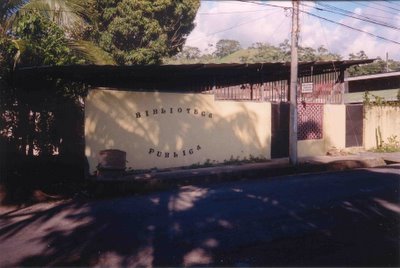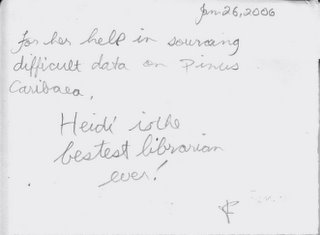Interview, eh? A Canadian student.
Welcome to the next exciting installment of my occasional interview series. I'd like to introduce Wendy Huot. Wendy's a fellow student at the University of British Columbia School of Library, Archival and Information Studies. She came to library school direct from an undergrad in Computer Science (which means that whenever a computer makes a funny noise and she's in the room, everyone looks her way and expects her to fix it). Since ALA handles accreditation for Canadian LIS programs, students in the six schools up here have a pretty big stake in what goes on in ALA. Don't we?
Heidi: Here goes. I know you joined the British Columbia Library Association (BCLA) last year (who wouldn't? the first year is free for students) but you've let your membership lapse. Why?
Wendy: I figure I'm probably going to be moving out of B.C. for my first post-library school job, so I figure I should save the money for membership in the provincial library association of wherever I end up. If I do get a job in B.C., I'll probably rejoin.
H: You've told me you're not a member of any other library associations. Why not? What would make you consider joining?
W: Being a student, I don't quite feel like I'm part of the professional librarian community yet -- I currently associate more with the library school community. There's a certain intimidation factor in the various professional/networking events the associations offer, and as someone who isn't a practicing professional yet, I don't feel like it's "my place" quite yet. I'm interested in the "continuing learning opportunities" that library associations offer, but I've got plenty of "learning opportunities" to focus on in school at the moment. I anticipate that I'll join the big professional associations once I get my first library gig, but I'm more interested in groups that are based on specialization or interest area rather than geographic location.
I considered joining CLA last year, but then I looked at the list of benefits and realized that, realistically, I wouldn't be taking advantage of many/any of them while still in library school. If I were to join, it would just be to give myself a false sense of feeling "professional," without actually *doing* anything.
H: Although you're born and raised in Canada, you're a dual citizen. It sounds like you're planning on working in Canada, at least for now. Would you consider joining ALA while you're in Canada? Would you join if you got a job in the US? Why/why not?
W: I would consider joining the ALA while in Canada, if someone gave me a compelling reason to do so. If I got a job in the US, I would definitely join. And why would I join? For Michael Gorman.
H: You went to the BCLA conference last year, right? Do you feel you benefited from attending a conference midway through your degree program?
W: Yeah; it was definitely a worthwhile experience, if for no other reason than that it gave me a mental picture of what a library conference is actually like. The sessions varied in quality, but they all gave me some food for thought. I can see the value of speaking at a conference, and I will consider doing it as a professional if I have an exciting project/approach that I'd like to share with the library community.
H: You came to library school right after undergrad, and you mentioned that you had a hard time meeting new people at the conference because you didn't feel equipped to talk shop with other librarians. Is there anything that could have improved your experience as a first time conference goer?
W: Actually, I can't think of anything the conference organizers could have done differently that would have made it less awkward -- and frankly, I didn't make much of an effort to mingle/network anyways. I have a better sense of what questions/conversation starters I'd use at my next conference, now that I have a better sense of the profession, the professional community, and the conference "experience."
H: What do you know about ALA? What's your impression of the organization? How does that compare to your knowledge or impressions of the Canadian Library Association?
W: It's big. Michael Gorman is the president. They publish reports and things I've referenced in papers, and I often wind up at their website for one reason or another. They've got lots of subcommittees. The big annual ALA conference is *huge.* I don't know what the subtle differences are between the ALA and the CLA; I just kinda figured that it's the American and Canadian flavour of the same kind of institution.
H: ALA handles accreditation for the Canadian LIS programs, yet there's zilch as far as an ALA presence in Canadian schools. Do you think ALA should make more of an effort to reach out to Canadian students? Do you feel any connection to ALA?
W: I feel their presence online, and in the library literature. I have no idea what they could possibly do to reach out to me specifically, as a Canadian student. What is this "reaching out" that you are talking about? What could it consist of? How could I benefit? Are we talking free pens or tote bags with the ALA logo on it? We all usually agree that "reaching out" is a good thing, but I don't know what the ALA could do for Canadian students that would be meaningful and beneficial for both parties.
H: Michael Gorman, ALA president, is focusing on LIS education during his term of office. Conceivably, this could have an impact on Canadian LIS education, too. Has this issue been brought to your attention at all? Have you paid much attention? If yes, what do you think about it?
W: I've heard a tiny bit about Gorman's LIS education focus, and it seems like a good focus, given that the profession is at a bit of a turning point right now and in a position to redefine itself. As for ALA influence on Canadian LIS education, I don't know much about the issues surrounding this or whether I should be concerned or not.
H: What role do library associations play in your professional growth and education as an LIS student?
W: Well, as mentioned previously, going to the BCLA conference was really beneficial. They publish some reports and articles that help me form a better sense of the role of the library, the library profession and its values. The student chapters of the BCLA/CLA and SLA have sponsored some great talks from guest speakers.
H: Are you as involved in library professional organizations as you would like to be? Why/why not? What factors affect this?
W: I'm not very involved with the professional organizations, but I guess I'm as involved as I want to be. My plan is that I'll become more involved when I become a practicing librarian. I look forward to partaking in some professional development opportunities (workshops, conferences). I look forward to reading the association publications and recognizing the names of people I know and feeling apart of the professional community.




